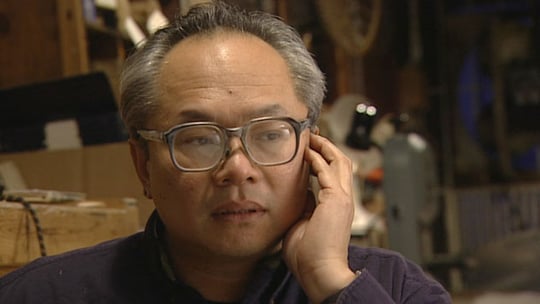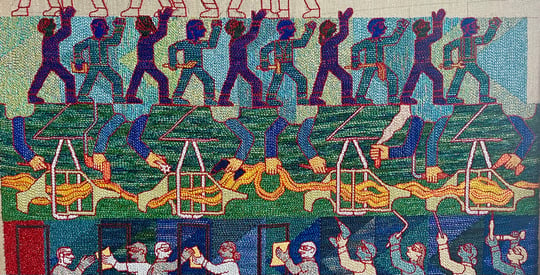[cont.]
The simple truth was some days the niceness of LA just plain got on her nerves. She wanted to have a discussion which wasn’t preordained to end in polite consensus. Any lack of agreement with even a smidgeon of intensity was defined as an argument and arguments were ungracious and unenlightened. She really missed having friends poke holes in her assertions. The only people who would argue with her were Dennis and Maggie and Maggie wasn’t around and sweet Dennis refused to talk about art. He informed her early in their marriage that he didn’t mind having ever increasing amounts of the stuff in the house but he didn’t want to talk about it. Ever. Finding an impassioned discussion of art was downright hard. Most older artists in LA had teaching jobs and would rather not dissect art in their off time. LA artists outside of academic circles were mostly youngsters who considered art conversation a pretentious affectation that mercifully ended with graduation. Niceness hadn’t just infected the arts, though. Even sales clerks and nurses were sunny here. This constant diet of niceness was monotonous and unconstructive. It felt as phony here as it did in Mississippi. Besides, how can anyone improve if everything they do is wonderful? Contentment, even under the veneer of promoting “world peace” and “inner harmony,” simply maintained a complacent status quo. But then New York took arguing too far the other way. People stopped speaking to one another over a bad choice of adverbs. What was the saying Maggie was fond of quoting to her? Staying in New York too long makes you hard; staying in LA too long makes you soft. In LA you talked quietly; in New York you had fights. Arguing is becoming a lost art, she had told Dennis and he reminded her that her momma used to say that even as a little child she could start an hour long argument with a sofa.
Mind you, this dissatisfaction with LA never lasted long. Contentment was considerably better for her blood pressure. And most of the time, Odessa had to admit that she was quite content. She and Dennis had moved here for this good life style, this fabulous weather. Good manners certainly made daily life easier but that propensity for glossing over problems promoted bland art, at least after the verve of raging hormones subsided. And that’s why young artists did so much better in LA than older ones. Artists needed to be ballsy, not nice. They needed the courage of their convictions and the willingness to muck things up a bit. Nice people don’t do that. That wouldn’t be nice at all.
Lori definitely did not look steady on her feet. Odessa quietly asked her intern to take a tall stool over to her. She could see Lori brusquely take the stool and then turn her back on the intern without a word. Withdrawal is a fairly common response to grief. Lori’s wounded animal approach, though, would not win her much sympathy around here except with those who also had experienced such loss.
Once enthroned, Lori slipped partially out of the shoes. Even from a distance, Odessa could see the swollen ridges the straps had dug into the tops of her feet. Lori had tried to look sharp for the opening without considering the long term consequences of new shoes. Odessa’s mother had always warned her that vanity was a double edged sword. And those feet looked like the sword had chopped them up and left them to marinade.
As Lori perched on the stool ignoring compliments and greetings, Tommy and Alex stayed close, as if to prop her up, to shield her. Grief has no protective formula in this country, no time demarcation. No one wears black to warn the unsuspecting of loss. In fact, mourners are expected to hide the suffering as quickly as possible and get back to “celebrating” life, moving on, moving forward. Lori, months after Hondo’s death, was still immersed in the raw phase of grief: the happiness and flippancy of those who were unaware of the depth of her sorrow had a physical impact on her. She seemed to recoil at any sound of laughter. At one point, when someone mentioned Hondo within her hearing, she began shaking and crying and the room emptied out real quick.
Teresa, on the other hand, was surrounded by a small cluster, all hugging each other and laughing the way old friends who haven’t seen one another in a good long while will do, just spontaneously laughing with delight at the sight of one another.
After Lori disappeared into the bathroom and didn’t come back, Tommy wandered over to the bar in the back room for another glass of wine.
“Come on over here,” Odessa motioned him into her office. “I know I’ve told you this before but I really love that little blue painting you gave me. Here, have some of the better stuff.” The better stuff consisted of a less cheap wine with a name, in this case Merlot, rather than simply being labeled Red Table Wine.
He laughed, obviously flattered. “I’m really glad you’re still so pleased with it. If you and your husband keep giving me rides home, though, you’ll have to get a livery license.”
“It’s always an adventure driving your truck back to your place.”
“Makes you appreciate power steering, doesn’t it?” He drank the cheap wine he was already holding in a single gulp and then took a full glass of the slightly better vintage, sipping it at first so it didn’t spill over.
Two big swigs later, he thanked her for not mentioning Hondo’s family in the obituary she wrote. “I know Lori appreciated it.”
“You didn’t think it was harsh? Nolan at the magazine thought it was too judgmental and wanted me to rewrite it to make it softer.”
“How was it harsh? The facts of his life are he didn’t bother with art school, he did drugs, he took a ton of pix, he was a good friend, and he died of an overdose.”
She could see his hand tighten around the plastic cup as he spoke. “So where’s Lori? Please don’t tell me she’s shooting up in the bathroom.” She was only partially joking.
“No,” he said with his eyes on the cracked edge of the plastic cup, “her drug of choice is self recrimination. She can’t accept that Hondo’s death wasn’t her fault.”
“It was tragic.”
“Tragic, shit. It was stupid, stupid and unnecessary. You know, I loved Hondo like a brother but he, crap,” Tommy shook his head. “He was so obsessed with how his family treated him that he never bothered to act on his own behalf. I’ve never met anyone so completely passive. His whole life, well it was like he starved himself to death to spite his grandmother. He could have moved out of the country, changed his name and rejected the wealth. He could have done anything but instead he just folded.”
“And Lori…”
Serial Reading: Just Like Suicide pt. 5
Related Stories
Art21 x Burnaway
Reviews
Features
Mel Chin Flows Free Again
In May's Art21 x Burnaway feature, we reflect on Mel Chin's genius and collaborative projects over the past decades.
Cora Nimtz: Unlikely Hunter at The Aquarium Gallery and Studio, New Orleans
Virginia Walcott reviews the Southern traditions, stereotypes, and romanticism found in the assemblages of Cora Nimtz: Unlikely Hunter at The Aquarium Gallery and Studio, New Orleans.
Weaving Work: On the Tapestries of Tabitha Arnold
Lina Alam profiles the spiritual allegories and the labor of weaving works created by Chattanooga-based artist Tabitha Arnold.




